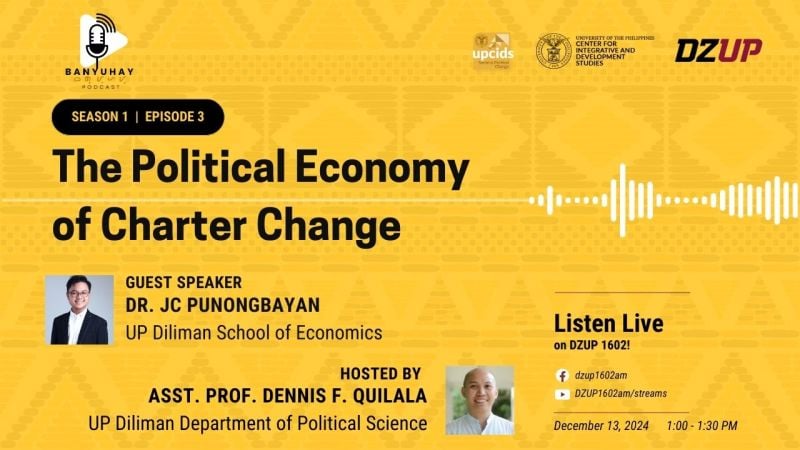Listen: “The Political Economy of Charter Change: Unpacking the Economic Implications” | A Podcast Episode

The Program on Social and Political Change (PSPC) launches Episode 3 of the podcast, “Banyuhay: Change, One Conversation at a Time,” on 13 December 2024, 1:00 pm via DZUP’s YouTube and Facebook account, and via UP CIDS’ Spotify channel.
For its inaugural season, Banyuhay focuses on the theme, “Uncharted Grounds: The Hidden Side of Charter Change,” which covers four episodes exploring the hidden dimensions of constitutional reform. The third episode featured a discussion with Dr. Jan Carlo B. Punongbayan, PhD from the UP School of Economics. He explores the concept of “constitutionalism,” specifically within the context of the Philippines and potential amendments to its constitution or popularly referred to as “cha-cha.”
Episode Topics
Distinguishing “Economic” Charter Change: explores whether there’s something unique about amending the constitution specifically for economic purposes, as opposed to other types of cha-cha being considered.
Impact on Ordinary Citizens: investigates the potential consequences—both positive and negative—of economic charter change on the daily lives of Filipinos.
Current Economic Situation and Potential Benefits: examines the state of the Philippine economy and analyzes whether constitutional amendments could truly improve it.
Necessity of Constitutional Change: questions whether amending the constitution is truly essential to achieve the desired economic improvements, or if other policy options might be more effective.
Proposed Changes: specific suggestions on what economic provisions in the constitution could and should be amended.
Guest Speaker
Dr. JC Punongbayan is an Assistant Professor at the University of the Philippines School of Economics (UPSE). He earned his PhD from UPSE in 2021, where he also graduated summa cum laude in 2009 and was awarded the José Encarnación Jr. Award for Excellence in Economics and the Gerardo P. Sicat Award for Best Undergraduate Thesis. He previously worked at the Securities and Exchange Commission, the World Bank Office in Manila, the FEU Public Policy Center, and the National Economic and Development Authority. His current research interests are macroeconomics, Philippine economic history, education economics, and development economics. JC writes a weekly economics column for Rappler.com. He is also co-founder of Usapang Econ and co-host of Usapang Econ Podcast. In 2023, his first book, False Nostalgia: The Marcos “Golden Age” Myths and How to Debunk Them, was published by the Ateneo de Manila University Press. In 2024, JC received the Outstanding Young Men (TOYM) Award for Economics. JC is the head researcher for the Philippine Microfinance Survey, a pioneering project of WeSolve Foundation, CARD, and ASA.
Host
Prof. Dennis Quilala is an assistant professor in the Department of Political Science of the University of the Philippines. He is currently a PhD candidate in the Department of Political Science and International Relations of the University of Canterbury and finished his Master of Arts in Political Science, University of the Philippines Diliman in 2005. He focuses on the study of peace processes and conflicts in the Philippines and Southeast Asia. His other research interests include political philosophy, local governance, human rights, and political violence. Among his publications is “Nongovernmental Organizations in Humanitarian Activities in the Philippines: Local Contributions in Post-Disaster Settings and Implications for Humanitarian Action and Diplomacy” in the Asian Journal of Comparative Politics, first published online on 5 November 2021 (co-written with Dr. Maria Ela Atienza).
Queries
For queries, please email: [email protected]
The Banyuhay Podcast is produced by the Program on Social and Political Change (PSPC) of the Center for Integrative and Development Studies, University of the Philippines, in partnership with DZUP.
The Program on Social and Political Change is one of the UP CIDS’ 18 research programs that focuses on sociopolitical issues of the Philippines. Learn more and download PSPC policy papers for free.